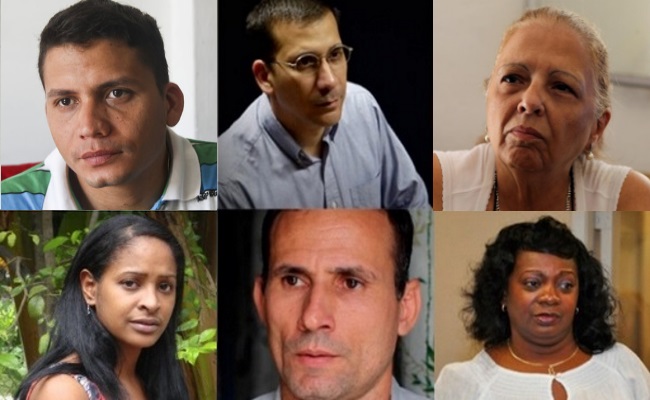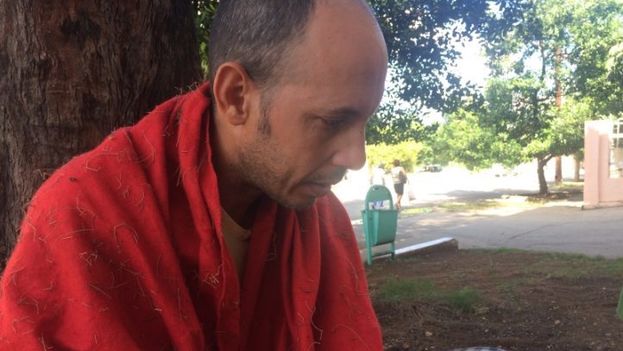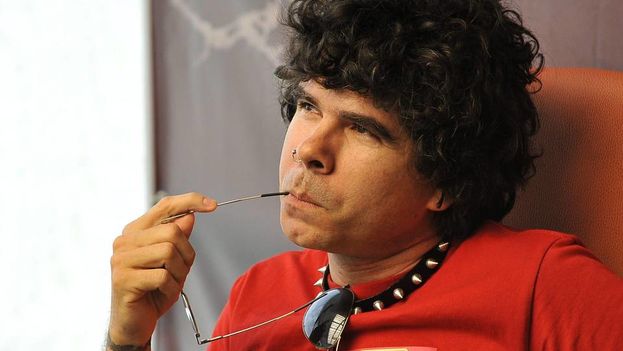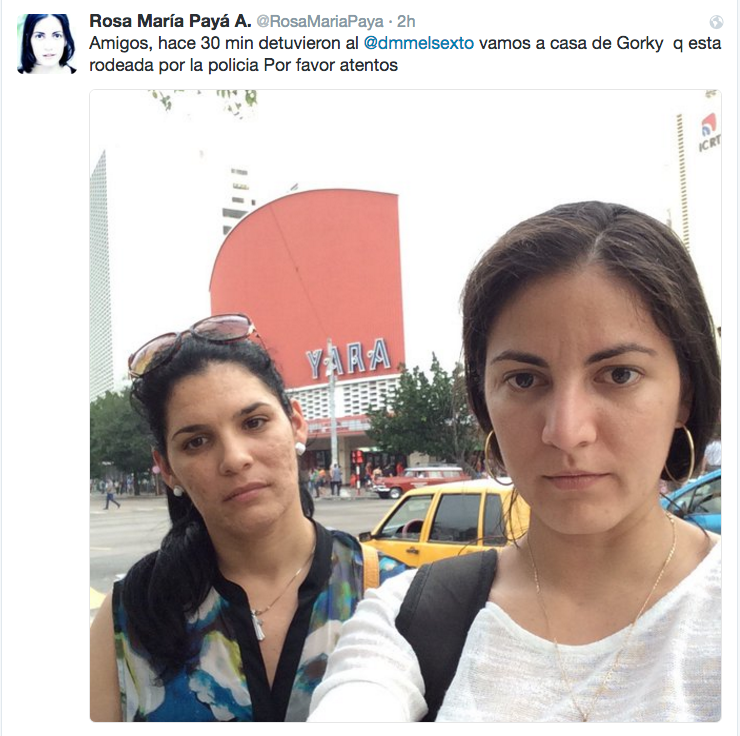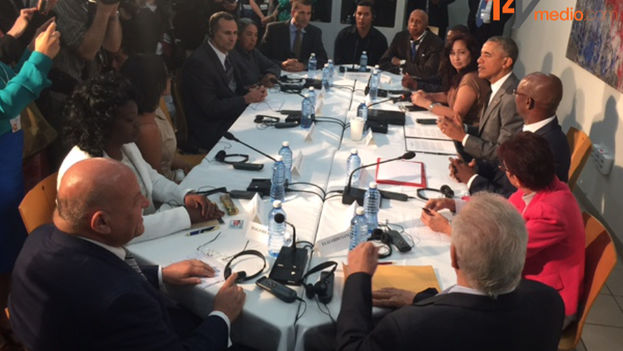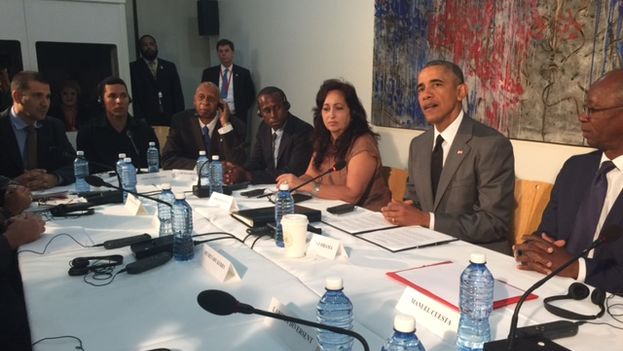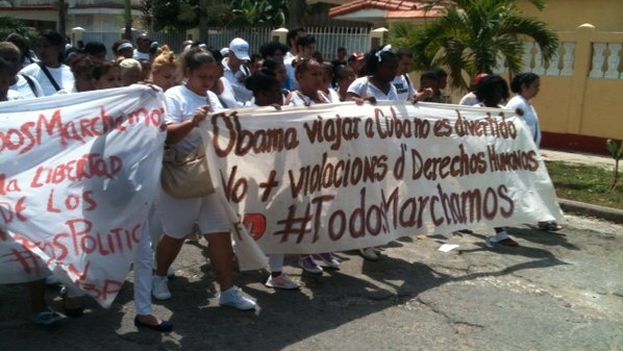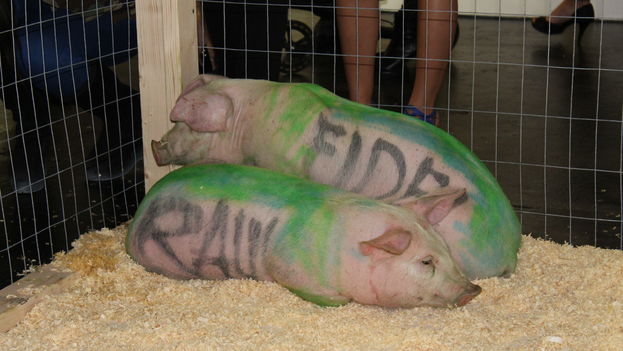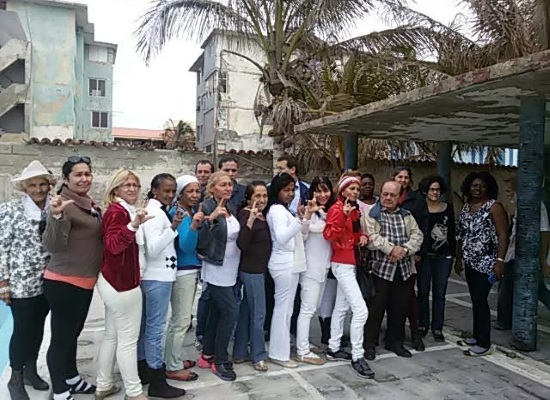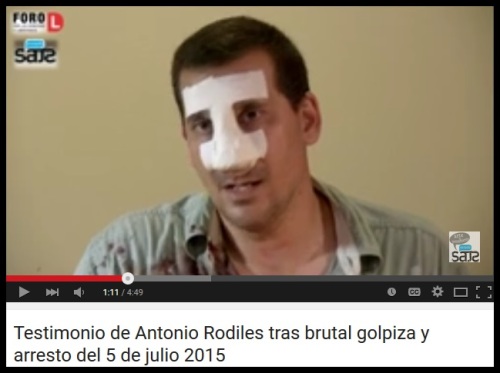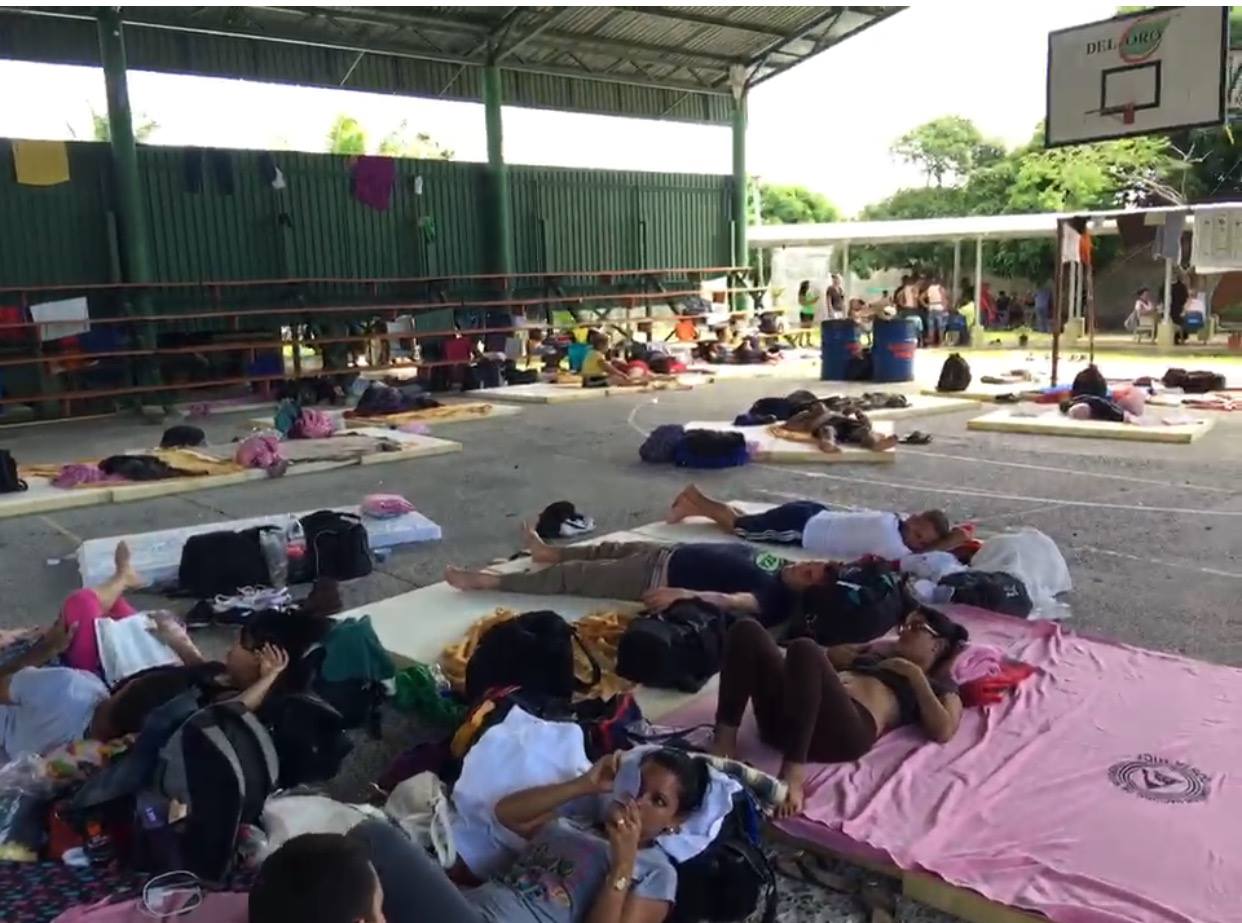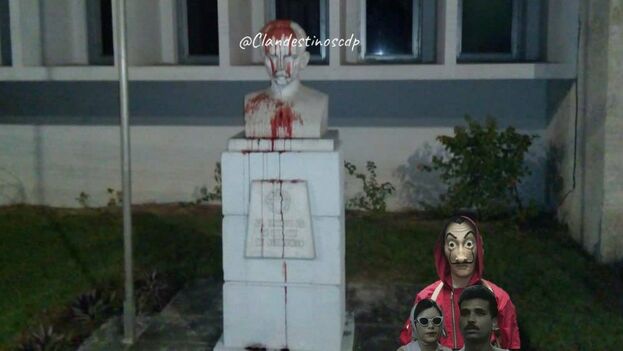
![]() 14ymedio, Luz Escobar/Mario J. Pentón, Havana/Miami, January 9, 2020 — Doubt, controversy and passion surround the Clandestinos, an anonymous group that through social networks says they have dumped pork blood on several busts of José Martí in Havana. The Government says it detained two of the members on Wednesday but the organization says it doesn’t know them.
14ymedio, Luz Escobar/Mario J. Pentón, Havana/Miami, January 9, 2020 — Doubt, controversy and passion surround the Clandestinos, an anonymous group that through social networks says they have dumped pork blood on several busts of José Martí in Havana. The Government says it detained two of the members on Wednesday but the organization says it doesn’t know them.
The official newspaper, Granma, said the police detained Panter Rodríguez Baró, 44, who had a record, and Yoel Prieto Tamayo, 29, for “the profanation of some busts of José Martí,” but without mentioning the name of the group.
“The offense was a dirty media ploy to create the belief that there is a climate of insecurity and violence in Cuba,” said the article, which was read on the news on television. continue reading
The information, read on Primetime News, also questioned the speed with which the news spread on social networks and independent media. “The photos that showed the busts of the national hero covered in pork blood were posted on the Internet a very short time after it was done,” the text pointed out. “Several alternative media that posted the story support those who try to orchestrate lies about the Cuban reality.”
The Clandestinos immediately denied any connection to those arrested. “We don’t know these people. No member of our organization has been detained,” said one of the members, without revealing his identity, in correspondence with 14ymedio and el Nuevo Herald.
“We’re not a political group,” added a presumed member of the Clandestinos, which claimed responsibility for throwing pork blood on Martí because “his image has been very manipulated by the dictatorship.”
“It’s an outrage that his name is used to reproach and abuse people,” he added. According to his version, the group chose the figure of Martí because “he is loved by all Cubans.”
“He’s our national hero, our apostle, and whatever action is taken with his figure has a great impact,” he added.
Since the beginning of the year, the Cuban internauts have been debating whether their actions were a form of protest or vandalism, or if it’s a strategy of the omnipresent State Security to justify its repression against the dissidents, but up to now there is little evidence and few witnesses.
In a tour by 14ymedio of several places where the Clandestinos said they carried out actions, there are few certainties. On January 4, the fence located on one side of the Ciudad Deportiva, where the faces of José Martí, Fidel Castro and Lázaro Peña can be seen, doesn’t show any intervention or traces of having been changed, although two days before, in a video of the Clandestinos, you can see a red stain.
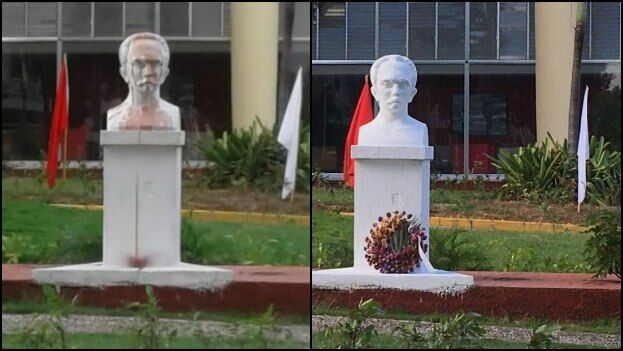
It wasn’t possible to find a bust with blood outside the Latin American Stadium, where the group said they poured blood over one of the sculptures. Nor were there traces of any action two days later outside the police station on calle Infanta near Manglar.
Attempts to obtain the exact locations of the stained busts from the Clandestinos didn’t help locate them. In addition, the authorities could have cleaned and painted many of them in the meantime.
The group’s name comes from a Fernando Pérez movie that addresses the clandestine struggle against the regime of Fulgencio Batista and it is careful not to give details that would allow identification of any of its members. One of them appeared in a Facebook video covered with a hood, and the press could only speak with him through chatting, and for a short time.
The official Cuban press has given free rein to its indignation but has been very frugal in releasing information concerning the facts, including the content of the arrest warrant. The personnel of the reviews Bohemia and Verde Olivio, whose writing is close to the buildings that are most emblematic of power in Havana, promote an act of repudiation against the Clandestinos, calling them “vile and unpatriotic counterrevolutionaries”.
According to Bohemia, a bust of Martí made by the now-deceased Cuban sculptor, José Delarra, had to be restored after the group’s action, but they didn’t show any photos of the action.
Vague opinion columns, texts of claims around the figure of the national hero, references to expected sanctions in the Penal Code against those “who don’t deserve to be called Cubans” have appeared in media like Cubadebate and Granma and have been replicated by members of the Government, including Miguel Díaz-Canel.
The Clandestinos assert that the photos give them recognition. “Why would the Government complain about something that didn’t happen?” they said, after many Cubans didn’t believe the photos and thought they were a hoax or something that was photoshopped on the social networks.
Anonymity makes it easy for people who don’t initially have ties to the Clandestinos to join the cause, whether by following or even by imitating them. Some Facebook posts are sharing the slogan “We are all Clandestinos”, placing the group in the predicament of having to claim or refute actions that can be carried out independently.
“We want to send a message to the dictatorship: this is war. We are tired of bowing our heads. And to the people the message is clear: The time has come,” said the supposed leader of the Clandestinos.
The organization has members in Cuba and in exile, added the spokesperson, refusing to reveal the number of militants. But he did say that they were mainly young people who were “tired of the dictatorship”.
One of the few witnesses of the Clandestinos’ actions was the meteorologist, Enrique Sánchez. “I was walking through the area of the Ministry of Transport and what called my attention was the stained, vandalized bust,” Sánchez told this newspaper.
“It was on January 1, in the afternoon, when I saw it. It made me mad so I took a photo in order to complain on Twitter about the lack of punishment for whoever was responsible,” he added. Sánchez stated that he didn’t agree with “desecrating national symbols as a mode of protest”.
A little later, this newspaper could confirm that the bust had been cleaned and painted and that an offering of flowers had been placed at the pedestal.
From Miami, where he was visiting, the dissident, Guillermo Fariñas, spoke about the subject with the América Noticias network. He showed an exchange of messages that he had with an internaut who identified himself as a member of the group. “What they’re doing is exercising the right of rebellion,” said the winner of the European Parliament’s Sakarov Prize for Freedom of Thought.
“It’s a group that doesn’t use our same nonviolent methods,” Fariñas said. “Other dissidents and I go down one path, but the right to rebellion exists, and they can go down a different path.”
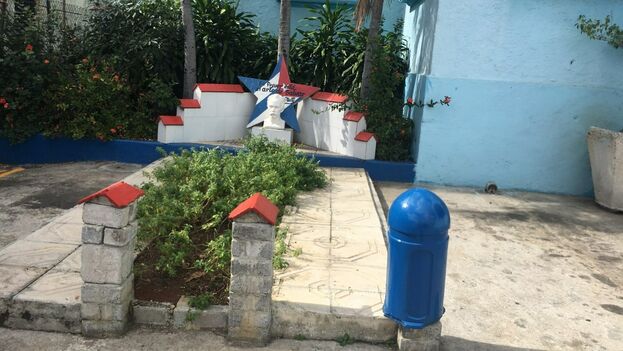
Meanwhile, the journalist and director of the magazine Tremenda Nota, Maykel González Vivero, wrote on Facebook, “The problem is that the bust is not alive and cannot defend itself. Martí is one thing, otherwise open to criticism, and the busts and pedestals are another. They speak about who erected them, not only of Martí himself, and they are something dead,” he added.
The dissident, Antonio González Rodiles, criticizes the Clandestinos movement. “In a time where it’s impossible for the opposition to hide anything from the Regime, it will do wonders for showing them as misfits, riffraff, vandals, incompetents–the Government has always used this line,” he wrote on his Facebook page. Several followers of the dissident said that the actions might be a provocation orchestrated by the Government.
In the last decades in Cuba there have been frequent cases of graffiti on walls and storefronts denouncing the acts of the authorities, with slogans like “Down with Fidel” or “Down with Raúl”. However, actions around the figure of José Martí have been more circumscribed on the artistic scene.
At the beginning of 2018, an intense debate erupted over the censorship of the film, I want to make a movie, directed by Yimit Ramírez. The Cuban Institute of Arts and Cinematography (ICAIC) removed the tape from the ICAIC Youth Show because one of the characters “says something unacceptable” about José Martí, calling him a “turd” and a “faggot”.
“This isn’t something that can be accepted simply as an expression of creative freedom,” said the institution in a statement published on Facebook, which further fuelled the debate over the sanctification of the figure of Martí.
Translated by Regina Anavy
________________
COLLABORATE WITH OUR WORK: The 14ymedio team is committed to practicing serious journalism that reflects Cuba’s reality in all its depth. Thank you for joining us on this long journey. We invite you to continue supporting us by becoming a member of 14ymedio now. Together we can continue transforming journalism in Cuba.

